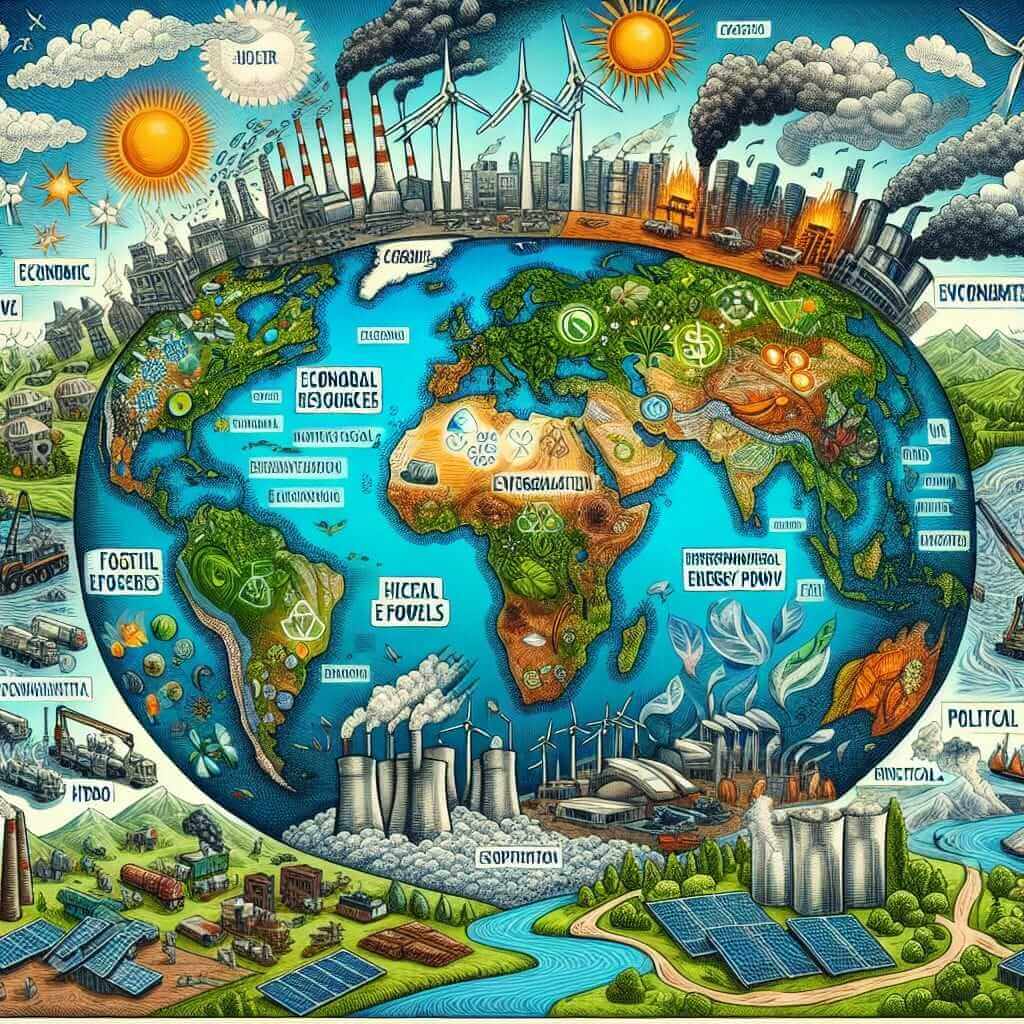The IELTS Reading section is a comprehensive test of your reading comprehension skills. The topic “Challenges in managing global energy resources” has gained considerable attention due to its relevance in today’s world. The frequency of such topical questions has been rising in recent IELTS exams, making this a critical area of focus. Understanding these issues not only prepares you for potential questions but also deepens your overall comprehension of current global challenges.
Reading Test
Below is a model IELTS Reading practice text, questions, and corresponding answers designed to provide you with a realistic exam experience.
Passage: Challenges in Managing Global Energy Resources
The global demand for energy has been on a steady rise over the past decades, driven by population growth, industrialization, and technological advancements. Despite efforts to transition towards renewable energy sources, fossil fuels still dominate the global energy mix. Managing these energy resources poses significant challenges due to economic, environmental, and political factors.
Economic concerns are at the forefront of the global energy discourse. Countries heavily reliant on fossil fuels, such as oil, coal, and natural gas, face the dilemma of balancing economic growth with sustainable practices. The fluctuating prices of these resources can lead to economic instability, affecting both developed and developing nations. Additionally, the high initial investment costs for renewable energy infrastructure pose financial barriers for many countries.
Environmental challenges are equally critical. The extraction, processing, and consumption of fossil fuels result in detrimental environmental impacts including air and water pollution, habitat destruction, and significant greenhouse gas emissions contributing to climate change. Although renewable energy sources like wind, solar, and hydroelectric power offer cleaner alternatives, they are not without environmental concerns. For instance, large-scale solar farms require vast tracts of land, potentially disrupting local ecosystems, while hydroelectric projects can affect aquatic life and river dynamics.
Politically, the global energy landscape is fraught with complexities. Energy security is a pivotal issue, with nations striving for self-sufficiency to avoid dependence on external suppliers. Geopolitical tensions often arise over control and access to energy resources, exemplified by conflicts in resource-rich regions. International cooperation is critical, yet challenging to achieve, as nations prioritize their energy needs and economic interests.
Efforts to address these challenges involve a multifaceted approach. Enhancing energy efficiency, diversifying energy sources, and fostering international collaboration are imperative steps. Technological advancements are also pivotal, with innovations such as smart grids and energy storage systems playing crucial roles in optimizing energy use and integrating renewable sources.
Questions
Multiple Choice
-
What is the primary driver of the rise in global energy demand?
A. Population decline
B. Industrialization
C. Energy conservation efforts
D. Decrease in fossil fuel use -
What is a major economic challenge in managing global energy resources?
A. Renewable energy causes more pollution
B. Fossil fuels are becoming cheaper
C. The fluctuating prices of fossil fuels
D. Solar farms require less land
Identifying Information (True/False/Not Given)
- Fossil fuels account for a minor part of the global energy mix.
- Renewable energy infrastructure requires high initial investments.
- Wind energy has no environmental impact.
Sentence Completion
- The extraction of fossil fuels leads to ____.
- Large-scale solar farms can disrupt ____.
Answer Key
Multiple Choice
- B. Industrialization
- C. The fluctuating prices of fossil fuels
Identifying Information (True/False/Not Given)
- False
- True
- False
Sentence Completion
- air and water pollution
- local ecosystems
Common Mistakes
- Misinterpreting the Question: Always ensure that you fully understand what the question is asking before selecting an answer.
- Skimming Too Quickly: While skimming is a useful technique, doing it too quickly might lead to missing significant details.
- Ignoring Context: Context is crucial. Always consider the surrounding content of the text and questions.
Vocabulary
- Fluctuating (adj.): /ˈflʌk.tʃu.eɪ.tɪŋ/ – changing frequently, especially in size, amount, and price.
- Detrimental (adj.): /ˌdɛt.rɪˈmɛn.təl/ – harmful; causing damage or injury.
- Habitat (n.): /ˈhæb.ɪ.tæt/ – the natural home or environment of an animal, plant, or other organism.
- Geopolitical (adj.): /ˌdʒiː.oʊ.pəˈlɪt.ɪ.kəl/ – relating to politics, especially international relations, as influenced by geographical factors.
- Multifaceted (adj.): /ˌmʌl.tiˈfæs.ɪ.tɪd/ – having many facets or aspects.
Grammar Focus
-
Present Perfect Continuous Tense: Used to describe an action that started in the past and continues to the present. E.g., “The global demand for energy has been rising steadily.”
Formula: Subject + has/have + been + verb-ing.
Example: “She has been working on this project for two years.”
Tips for Scoring High in IELTS Reading
- Practice Regularly: Regular practice helps improve your reading speed and comprehension.
- Improve Vocabulary: A robust vocabulary aids in better understanding and quicker answers.
- Understand Question Types: Familiarize yourself with different question types to avoid surprises in the exam.
- Time Management: Allocate your time wisely and practice completing sections within the time limits.
By focusing on these strategies and practicing with realistic reading passages, you can enhance your performance in the IELTS Reading section.

For further reading, consider checking our posts on Challenges in Achieving Economic Sustainability and Impact of Renewable Energy on Global Economic Policies. These articles provide additional context and enhance your understanding of related topics in IELTS Reading.